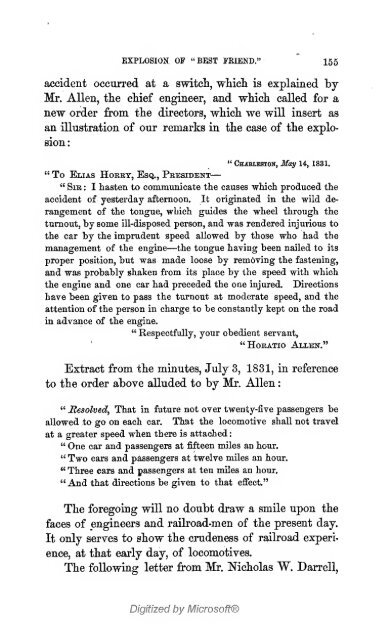The history of the first locomotives in America. From original ...
The history of the first locomotives in America. From original ...
The history of the first locomotives in America. From original ...
Create successful ePaper yourself
Turn your PDF publications into a flip-book with our unique Google optimized e-Paper software.
EXPLOSION OF "BEST FRIEND." 155<br />
accident occurred at a switch, wMcli is expla<strong>in</strong>ed by<br />
Mr. Allen, <strong>the</strong> chief eng<strong>in</strong>eer, and which called for a<br />
new order from <strong>the</strong> directors, which we will <strong>in</strong>sert as<br />
an illustration <strong>of</strong> our remarks <strong>in</strong> <strong>the</strong> case <strong>of</strong> <strong>the</strong> explo-<br />
sion:<br />
" To Elias Hoeet, Esq., Pkesident—<br />
" Charleston, May 14, 1831.<br />
"Sie: I hasten to communicate <strong>the</strong> causes which produced <strong>the</strong><br />
accident <strong>of</strong> yesterday afternoon. It orig<strong>in</strong>ated <strong>in</strong> <strong>the</strong> wild derangement<br />
<strong>of</strong> <strong>the</strong> tongue, which guides <strong>the</strong> wheel through <strong>the</strong><br />
turnout, by some ill-disposed person, and was rendered <strong>in</strong>jurious to<br />
<strong>the</strong> car by <strong>the</strong> imprudent speed allowed by those who had <strong>the</strong><br />
management <strong>of</strong> <strong>the</strong> eng<strong>in</strong>e—<strong>the</strong> tongue hav<strong>in</strong>g been nailed to its<br />
proper position, but was made loose by remov<strong>in</strong>g <strong>the</strong> fasten<strong>in</strong>g,<br />
and was probably shaken from its place by <strong>the</strong> speed with which<br />
<strong>the</strong> eng<strong>in</strong>e and one car had preceded <strong>the</strong> one <strong>in</strong>jured. Directions<br />
have been given to pass <strong>the</strong> turnout at moderate speed, and <strong>the</strong><br />
attention <strong>of</strong> <strong>the</strong> person <strong>in</strong> charge to be constantly kept on <strong>the</strong> road<br />
<strong>in</strong> advance <strong>of</strong> <strong>the</strong> eng<strong>in</strong>e.<br />
" Respectfully, your obedient servant,<br />
"HoEATio Allen."<br />
Extract from <strong>the</strong> m<strong>in</strong>utes, July 3, 1831, <strong>in</strong> reference<br />
to <strong>the</strong> order ahove alluded to by Mr. Allen<br />
" Hesolved, That <strong>in</strong> future not over twenty-five passengers be<br />
allowed to go on each car. That <strong>the</strong> locomotive shall not travel<br />
at a greater speed when <strong>the</strong>re is attached:<br />
" One car and passengers at fifteen miles an hour.<br />
" Two cars and passengers at twelve miles an hour.<br />
" Three cars and passengers at ten miles an hour.<br />
" And that directions be given to that efiect."<br />
<strong>The</strong> forego<strong>in</strong>g will no doubt draw a smile upon <strong>the</strong><br />
faces <strong>of</strong> eng<strong>in</strong>eers and railroad-men <strong>of</strong> <strong>the</strong> present day.<br />
It only serves to show <strong>the</strong> crudeness <strong>of</strong> railroad experi-<br />
ence, at that early day, <strong>of</strong> <strong>locomotives</strong>.<br />
<strong>The</strong> follow<strong>in</strong>g letter from Mr. Nicholas W. Darrell,<br />
Digitized by Micros<strong>of</strong>t®<br />
:
















